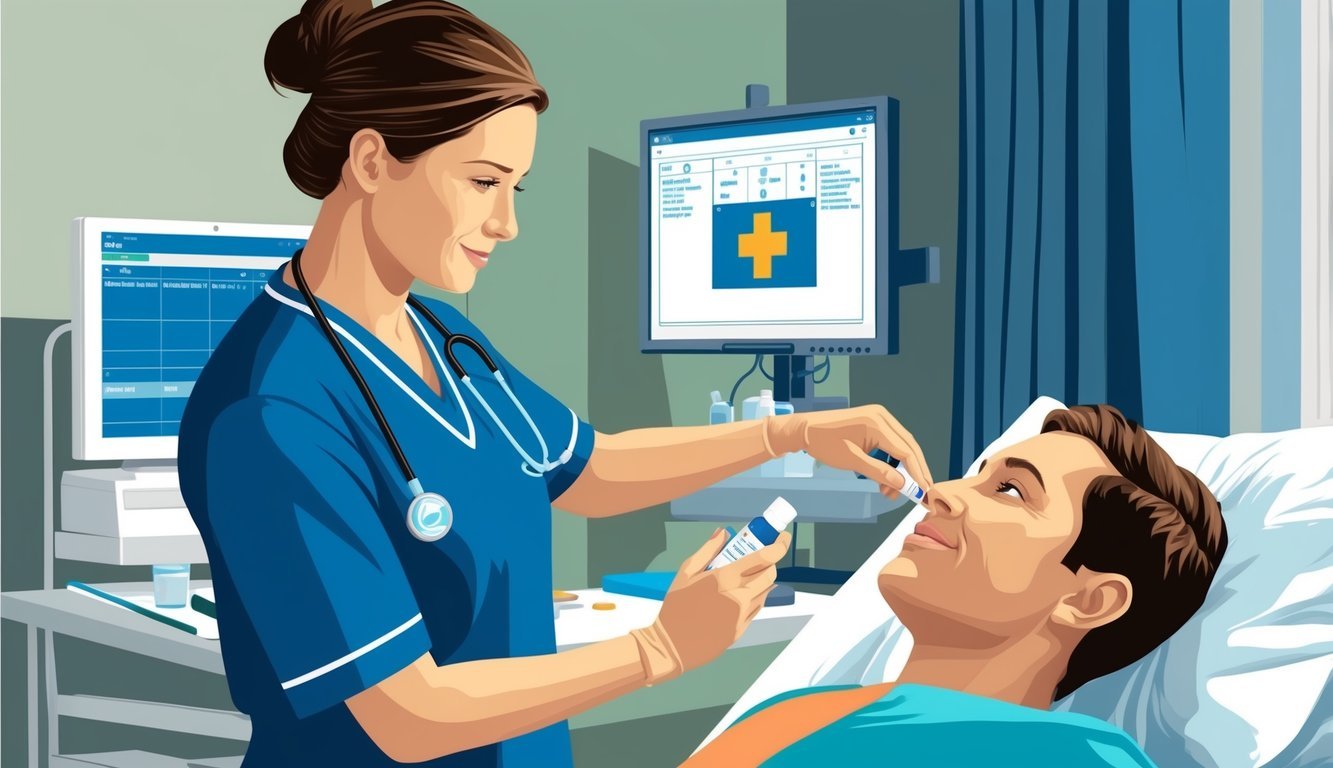The transition to a Bachelor of Science in Nursing (BSN) degree offers numerous advantages that can significantly enhance your nursing career. Earning a BSN can increase your earning potential by nearly $20,000 annually compared to those with an associate degree in nursing (ADN).
This difference is not just financial; a BSN equips you with advanced skills and knowledge that are increasingly favored by employers, particularly in competitive healthcare environments.
In today’s evolving healthcare landscape, many employers prefer BSN-prepared nurses due to their broader training in nursing education and the ability to adapt to complex patient care needs.
The emphasis on holistic care in BSN programs prepares you for roles that impact patient outcomes positively, making you a more valuable asset in any clinical setting.
Hospitals aiming for Magnet status often require nurses with a BSN, further highlighting the degree’s importance.
As you consider advancing your nursing education, exploring the benefits of a BSN can provide clarity on your professional path.
Not only does it enhance job prospects, but it also opens doors to leadership and specialized roles in nursing.
Investing in a Bachelor of Science in Nursing means investing in your future, setting the stage for a rewarding and impactful career.
Foundational Benefits of BSN Education
Pursuing a Bachelor of Science in Nursing (BSN) offers significant advantages that enhance your skills and broaden your understanding of healthcare.
This educational path equips you with essential knowledge and competencies, preparing you for the complexities of modern nursing.
Enhanced Nursing Skills
BSN programs focus on developing advanced nursing skills, including critical thinking and health assessment.
You will learn to apply nursing theories effectively in various clinical settings.
This foundation allows you to approach patient care with a comprehensive perspective.
Through coursework in evidence-based practice, you gain the ability to integrate research into clinical decision-making.
This not only improves your patient outcomes but also fosters a culture of continuous improvement within healthcare settings.
Additionally, enhanced communication skills are emphasized, enabling you to collaborate effectively with interdisciplinary teams.
Broader Understanding of Healthcare
A BSN education provides a broader understanding of healthcare beyond direct patient care.
You will study the healthcare system as a whole, including policies and ethical frameworks.
This knowledge equips you to navigate complex organizational structures and advocate for improved patient care.
Courses in community health and public policy expand your awareness of social determinants of health.
This understanding is crucial for addressing disparities in care and promoting health equity.
Furthermore, exposure to diverse patient populations during your training fosters cultural competence, allowing you to deliver sensitive and appropriate care to all individuals.
For more on the importance of a BSN, consider resources from NurseJournal and AACN.
Career Advancement and Professional Development

In today’s evolving healthcare landscape, pursuing a Bachelor of Science in Nursing (BSN) opens new avenues for career growth.
This degree not only enhances your skills but also positions you for leadership opportunities and specialized roles within the nursing field.
Leadership Opportunities
With a BSN, you are well-equipped to take on leadership roles in various healthcare settings.
Leadership positions often require advanced communication skills, strategic planning, and the ability to mentor others.
Common leadership roles include:
- Charge Nurse
- Nurse Manager
- Director of Nursing
These positions allow you to influence healthcare policies and improve patient outcomes.
In an RN-to-BSN program, you will gain essential knowledge in management and leadership that prepares you for these responsibilities.
For more information on nursing leadership resources, consider visiting the American Organization for Nursing Leadership.
Specialization and Advanced Roles
Earning a BSN can also facilitate entry into specialized nursing fields.
You can pursue advanced practice roles such as Nurse Practitioner (NP) or Clinical Nurse Specialist (CNS), which often require additional certifications.
Explore some nursing specialties:
| Specialty | Focus Area |
|---|---|
| Family Nurse Practitioner (FNP) | Comprehensive family care |
| Psychiatric Nurse Practitioner | Mental health and psychiatric services |
| Nurse Anesthetist (CRNA) | Anesthesia care in surgical settings |
These positions often come with increased responsibility and the potential for higher salaries.
Furthermore, the skills you develop through a BSN program are crucial for taking on these advanced roles, contributing to your professional development.
For more insights into specialization, you can check resources like the American Association of Nurse Practitioners.
Improving Patient Outcomes

Investing in baccalaureate-prepared nurses (BSNs) enhances the quality of patient care and health promotion.
Their education equips them with critical thinking skills and a strong foundation in evidence-based practices, leading to improved patient outcomes.
Nursing Practice and Patient Care
BSN nurses are trained to utilize advanced clinical skills in diverse settings.
Their education emphasizes not only technical skills but also communication and leadership, which are vital for effective patient interactions.
In Magnet Hospitals, the presence of BSN nurses correlates strongly with better patient outcomes.
Studies show that organizations with a higher percentage of BSN-prepared staff experience reduced readmission rates and lower patient mortality.
Key Benefits include:
- Enhanced decision-making abilities
- Improved patient satisfaction
- Reduced medical errors
These factors contribute significantly to safer patient care environments, leading to better overall health outcomes.
Health Promotion and Public Health
BSN nurses play a crucial role in health promotion and public health initiatives.
Their training prepares them to address community health needs and implement preventative measures to improve population health.
They engage in educational campaigns and community outreach programs, helping to raise awareness about health issues.
In Public Health, BSN nurses are often involved in:
- Vaccination programs
- Chronic disease management
- Health screenings
By fostering community engagement and providing health education, BSN-prepared nurses directly impact health disparities, ultimately enhancing public health.
Their contributions are essential for cultivating healthier communities and improving overall patient outcomes.
Financial and Employment Opportunities

Pursuing a Bachelor of Science in Nursing (BSN) can significantly enhance your career through increased earning potential and diverse job opportunities.
The current job market showcases strong demand for BSN-prepared nurses, making this a valuable investment in your future.
Earning Potential
One of the most compelling reasons to obtain a BSN is the potential for higher salaries.
Data indicates that BSN-prepared nurses earn nearly $20,000 more annually compared to their Associate Degree in Nursing (ADN) counterparts.
| Degree Type | Average Annual Salary |
|---|---|
| ADN | $77,000 |
| BSN | $94,000 |
This difference can translate to substantial financial benefits over time.
The investment in your education often leads to quicker advancement in roles that offer competitive compensation and benefits.
Job Market Demand
The demand for BSN-prepared nurses is high, contributing to better job security.
Many hospitals and healthcare settings now prefer or require a BSN for hiring.
Some key facts about job opportunities include:
- Increasing need for BSN nurses in diverse settings.
- Competitive edge for leadership and specialized roles.
- Access to Magnet hospitals, which often favor BSN graduates.
This demand points to a growing trend where employers recognize the value of advanced training in nursing, making a BSN a strategic choice for long-term career success.
For more insights on the topic, consider exploring career options with a BSN.
Continuing Education and Advancement
In the nursing field, furthering your education can significantly enhance your career prospects.
Engaging in graduate education paths and committing to lifelong learning are essential for professional growth and maintaining clinical competence.
Graduate Education Paths
Pursuing advanced degrees can open various avenues for career advancement.
Common pathways include:
- Master of Science in Nursing (MSN): This degree prepares you for leadership roles and specialized clinical positions. An MSN may lead to roles such as nurse practitioner or clinical nurse specialist.
- Doctor of Nursing Practice (DNP): If you seek the highest level of clinical practice, a DNP focuses on evidence-based practice and transforms healthcare delivery.
- Accelerated BSN Program: For individuals with a non-nursing degree, this program offers a fast-tracked path to obtaining your BSN in about 12 to 18 months.
You can find numerous online RN-to-BSN programs that allow you to advance your education without sacrificing your current job.
Lifelong Learning and Growth
Engaging in lifelong learning is crucial for enhancing your clinical skills and knowledge base.
Continuing education opportunities can involve:
- Workshops and Conferences: Participate in events that keep you updated on emerging healthcare trends.
- Online Courses: Various platforms host continuing education courses that are focused on specific practices or technologies.
- Certifications: Earning specialty certifications can boost your resume and demonstrate your expertise in particular areas of nursing.
Continuing education not only keeps you informed about advancements but also reinforces your commitment to providing high-quality patient care.
Embracing these opportunities for growth can significantly impact your professional trajectory.

